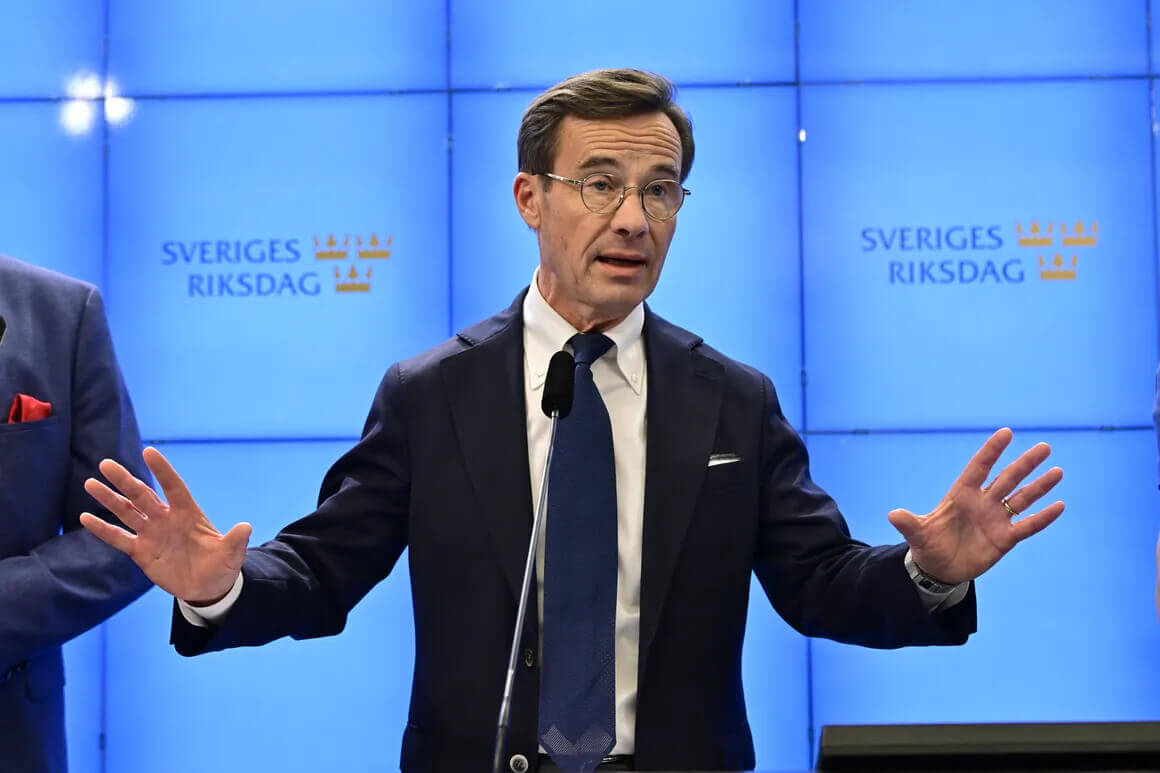Sweden’s parliament voted to appoint Moderate Party leader Ulf Kristersson as the country’s new prime minister, paving the way for him to lead a coalition of centre-right parties.
Kristersson said he appreciated the popular approval of their call for a “mandate for change.” He is scheduled to deliver an address in parliament today, wherein he will present a new government platform and reveal his cabinet.
Welcome Ulf Kristersson to the next #EUCO in Brussels as @SwedishPM
— Charles Michel (@CharlesMichel) October 17, 2022
Important challenges ahead.
Energy, #Ukraine and external relations.
Looking forward to cooperate with you and with Sweden.
Kristersson emerged victorious after securing a narrow majority during the general election last month, which forced now-former PM Magdalena Andersson to resign.
Although Andersson’s Social Democrats party secured the largest number of votes, her three centre-right allies failed to gather sufficient votes to secure a majority.
The far-right and anti-immigration Sweden Democrats emerged as the second-largest party with 20.6% of the vote share, allowing it to form a centre-right coalition with the conservative Moderates, the Christian Democrats, and the Liberals with 176 seats, marginally more than Andersson’s alliance, which secured 173 seats.
Kristersson, from the Moderate Party, secured the same three-seat majority during Monday’s vote. While the Sweden Democrats will not officially be part of the ruling coalition (which is made up of the Moderates, Christian Democrats, and Liberals), it will support the government from the outside.
While the party with the highest votes in the coalition usually appoints the PM, Kristersson is a more favourable choice compared to Sweden Democrats leader Jimmie Åkesson, who has more divisive and extreme views, particularly given the party’s neo-Nazi roots.
🇸🇪 Congratulations Ulf Kristersson on your election as Prime Minister of Sweden.
— Ursula von der Leyen (@vonderleyen) October 17, 2022
Sweden will soon hold the presidency of the Council of the EU at a crucial time.
I’m looking forward to working together to address the multiple challenges our Union is facing.
In 2010, after the Sweden Democrats first entered the Parliament, the party was shunned by all other political players. After emerging from a neo-Nazi movement in the 1980s, the party sought to improve its image to enter mainstream politics by focusing on Swedish national traditions and culture.
In this regard, the Sweden Democrats’ emergence as the second-largest party marks a major monumental change in Swedish politics. In particular, their status as a supporting partner but not a coalition member gives them what some analysts have described as “blackmailing” power.
Jonas Hinnfors, a political scientist at the University of Gothenburg, told the New York Times: “If there are differences of opinion, they can veto a measure,” adding, “The government needs them, and they can withdraw support at any moment.” He underscored, “This gives them a lot of informal power,” he said, noting that it is an “ideal situation” for the Sweden Democrats.
In this regard, local newspapers have described Kristersson as a “locksmith” for the far-right.
The coalition government released a 62-paged roadmap on Friday that doubles sentences for gang-related crimes and increases police powers in certain neighbourhoods (e.g. empowering them to stop and search suspects people for weapons without establishing probable cause).
Furthermore, asylum-seekers will be restricted from exiting their transit centres while their applications are being processed. It also plans to outlaw begging.
Congratulations to Ulf Kristersson @moderaterna on being elected PM of Sweden. I'm sure 🇺🇦-🇸🇪 cooperation will continue active development, and 🇸🇪’s support in the fight against Russian aggression will increase. I am grateful to Magdalena Andersson for solidarity & supporting 🇺🇦.
— Володимир Зеленський (@ZelenskyyUa) October 17, 2022
The coalition parties also vowed to restrict immigration by introducing more robust border controls, incentivising return to countries of origin, and deporting refugees accused of “misconduct.”
With these restrictive measures, they aim to reduce resettlements through the United Nations High Commission for Refugees from over 6,000 per year to just 900.
Sweden Democrats leader Akesson said that the coalition will usher in a “paradigm shift” in Sweden’s immigration policy based on “order, reason, and common sense.” While the alliance has extended its support for immigrants provided they adopt Swedish culture, the parties are united in their opposition to Muslim immigrants, arguing that their arrival from various Islamic countries during the Arab Spring has increased crime.
The coalition also vowed to introduce tax cuts and set an upper limit on benefits. Furthermore, the government will reverse its predecessors’ aim of allotting 1% of its gross national income to development aid.
However, the government will still have to confront other challenges, such as rising energy prices, balancing the rising domestic anti-European Union voices during its bloc presidency, and ongoing negotiations for North Atlantic Treaty Organization membership.

